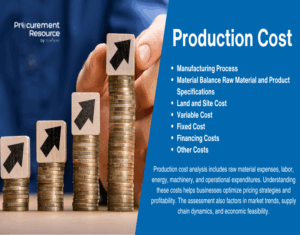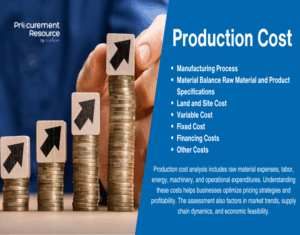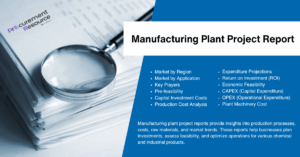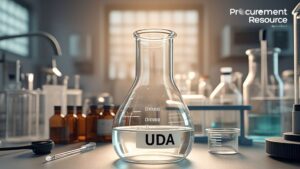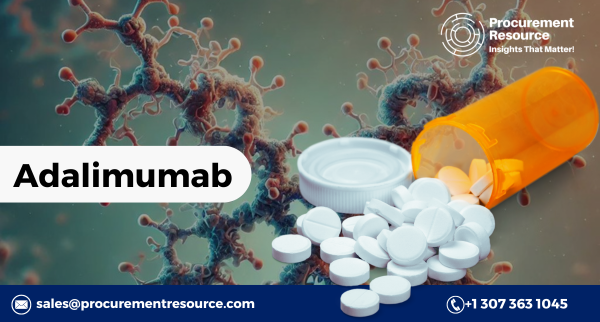
Adalimumab Production Cost
Adalimumab is a fully human monoclonal antibody, widely known for its effectiveness in treating various autoimmune disorders such as rheumatoid arthritis, Crohn’s disease, ulcerative colitis, and psoriatic arthritis. Belonging to the TNF inhibitor class, it targets and blocks the action of tumor necrosis factor-alpha (TNF-α), a key mediator of inflammation in these conditions. While Adalimumab offers significant therapeutic benefits, its production is costly due to the complexities involved in manufacturing biologics. This article examines the various factors that influence the Adalimumab Production Cost, including raw materials, labor, equipment, regulatory compliance, and possible cost reduction strategies.
1. Overview of the Adalimumab Production Process
The production of Adalimumab involves several intricate stages due to its nature as a biologic. The manufacturing process consists of the following key stages:- Cell Line Creation: Adalimumab is produced using recombinant DNA technology, where genetically engineered cell lines (often Chinese Hamster Ovary (CHO) cells) are developed to generate the desired antibody.
- Cell Culture and Fermentation: The engineered cells are cultured in bioreactors, which range from small to large-scale (thousands of liters), where the cells produce the antibody. These cells are nurtured in a carefully monitored environment, supported by a nutrient-rich medium.
- Purification: After the antibody is produced, it must undergo purification to remove unwanted substances such as host cell proteins and DNA. This is accomplished through filtration, chromatography, and other purification methods.
- Formulation: The purified antibody is then formulated into an injectable solution, ensuring it remains stable and effective during storage. Various excipients and stabilizers are added to maintain the product’s quality.
- Fill and Finish: This stage involves filling the final product into vials or syringes under sterile conditions, labeling, and preparing it for distribution.
- Quality Control and Regulatory Oversight: Extensive quality control testing occurs throughout the production process to ensure that the final product adheres to strict safety and efficacy standards set by regulatory authorities.
2. Key Factors Influencing Adalimumab Production Costs
Producing biologics like Adalimumab incurs high costs due to the intricacies involved in the process. Several factors contribute to these costs:a. Raw Materials
Adalimumab production relies on the use of highly specialized raw materials, particularly those needed for cell culture and purification.- Cell Culture Media: The media used to cultivate CHO cells must be enriched with essential nutrients, amino acids, and vitamins. This high-quality media is expensive, especially when large volumes are required for industrial-scale production.
- Serum and Growth Enhancers: While serum-free media is often used, some processes may require the addition of specific growth factors to improve cell performance, further adding to material costs.
- Chromatography Resins and Filtration: The purification of the monoclonal antibody requires high-quality chromatography resins and filters. Since these components degrade over time, regular replacement is necessary, adding to ongoing expenses.
- Excipients and Stabilizers: Post-purification, the antibody is mixed with stabilizers such as sugars or surfactants to maintain its stability. These excipients must meet stringent purity standards, making them costly.
b. Labor
Labor costs are a major component of Adalimumab production. The complexity of biologic manufacturing requires a highly skilled workforce.- Specialized Workforce: The production of monoclonal antibodies like Adalimumab demands the expertise of scientists, engineers, and technicians trained in biotechnology and regulatory processes. Skilled labor in this industry commands high salaries, making labor a significant portion of the overall production cost.
- GMP Compliance: Adherence to Good Manufacturing Practices (GMP) requires ongoing training, validation, and monitoring of the production process, which adds further costs associated with labor.
c. Equipment and Facilities
The production of Adalimumab requires expensive and sophisticated equipment, which must be installed and maintained in specialized facilities.- Bioreactors: Bioreactors used for cell culture must be capable of providing precise conditions for cell growth and antibody production. Large-scale bioreactors and related equipment are extremely expensive to purchase and operate.
- Chromatography and Purification Systems: Purification processes involve advanced filtration and chromatography systems, which must handle large volumes of biologic material and ensure high efficiency in separating the antibody from impurities.
- Sterile Fill-Finish Equipment: The process of filling vials or syringes in a sterile environment is another cost-intensive step. Fill-finish facilities must operate under strict cleanroom conditions, adding to construction and maintenance costs.
- Maintenance and Depreciation: Ongoing maintenance of equipment and depreciation costs further add to the financial burden of producing biologics.
d. Quality Control
Ensuring product safety and efficacy requires rigorous quality control (QC) and testing at every stage of production.- Analytical Testing: Numerous tests are conducted to ensure that the product meets safety and quality standards, including tests for contamination, potency, and purity.
- In-Process Monitoring: Monitoring the production process in real-time is necessary to ensure consistency, and any deviations could lead to batch rejections, incurring additional costs.
- Batch Testing: After production, each batch undergoes stringent testing for sterility, stability, and potency before it can be released to the market.
e. Regulatory Compliance
The production of Adalimumab is subject to strict regulatory oversight by agencies like the U.S. FDA and the European Medicines Agency (EMA). Regulatory compliance costs include:- Clinical Trials: Extensive clinical trials are required to demonstrate the safety and efficacy of the drug. The costs of conducting these trials, from patient recruitment to data analysis, are significant.
- Regulatory Submissions: Submissions to regulatory authorities, such as Biologics License Applications (BLA), require detailed documentation of the manufacturing process, quality controls, and clinical trial outcomes. These submissions require considerable resources to prepare.
- Post-Marketing Surveillance: Even after regulatory approval, companies must continue monitoring the drug’s safety and efficacy in the market, adding to long-term costs.
f. Packaging and Distribution
Adalimumab requires specialized packaging and cold chain logistics due to its biologic nature.- Cold Chain Logistics: Biologic drugs like Adalimumab must be stored and transported under controlled temperatures (2-8°C) to maintain their stability and efficacy. This adds to transportation and storage costs.
- High-Quality Packaging: The vials or prefilled syringes must be of high quality to ensure sterility and patient safety, adding further costs.
